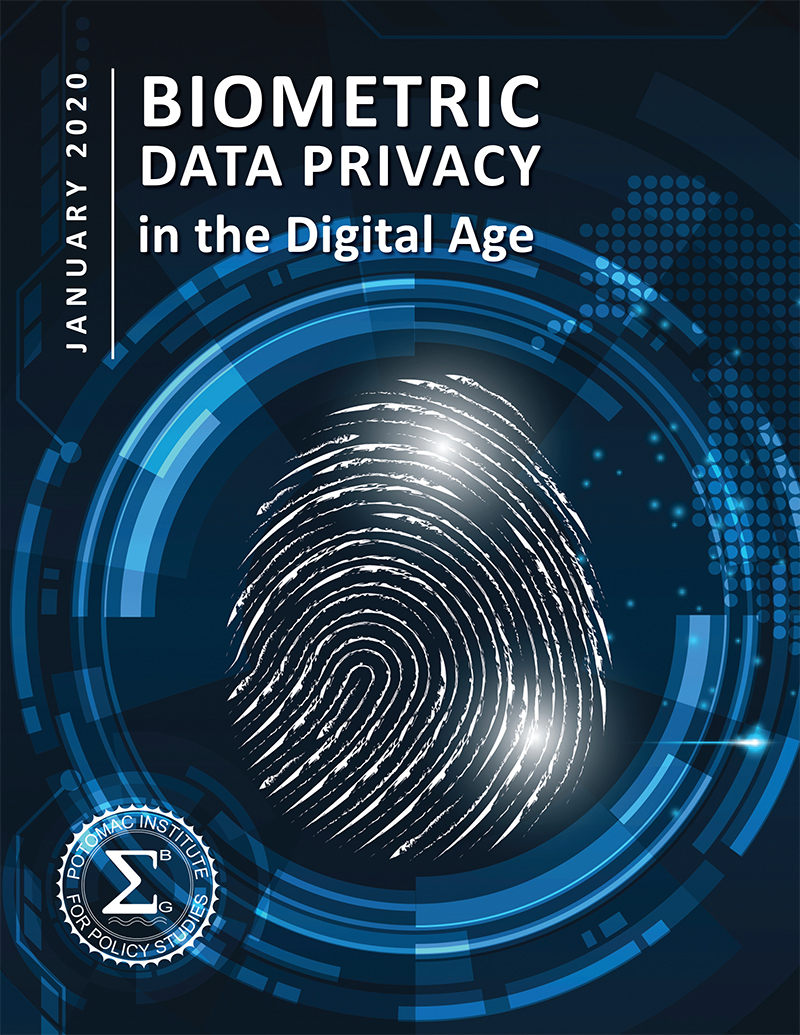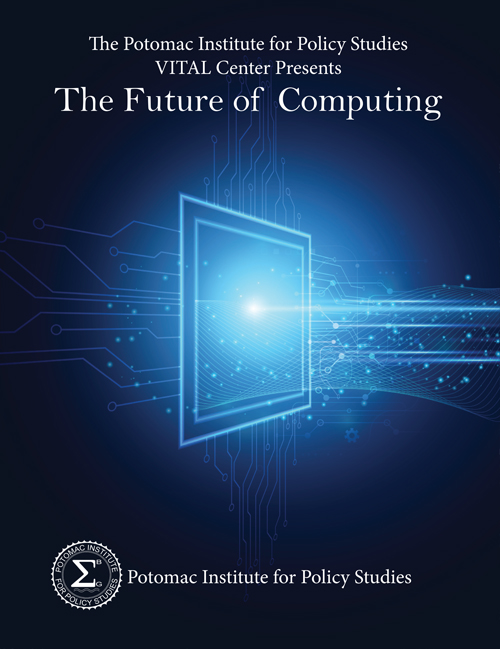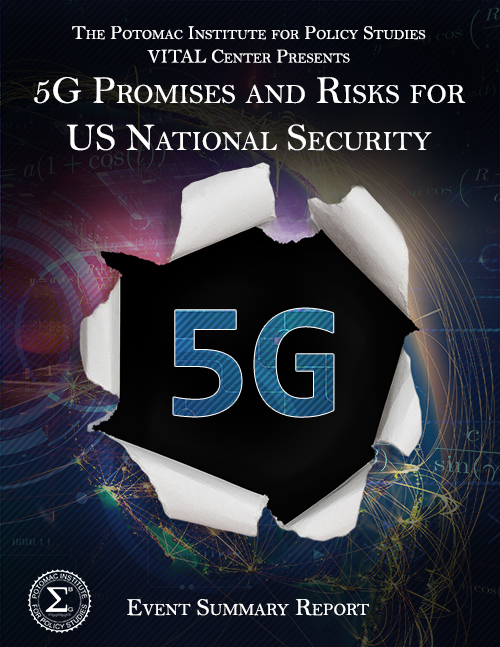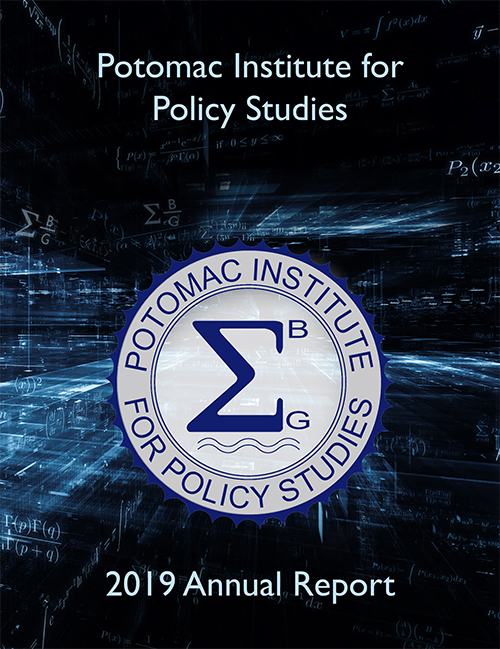Publications
 The Potomac Institute seeks to address improvements to biometric data policy that include privacy and security protections, while simultaneously allowing for research and innovation. This report provides findings on current biometric data practices and vulnerabilities, reviews current domestic policy, identifies shortcomings, and provides our recommendation for a policy approach to biometric data privacy. Ultimately, we suggest that to uphold American citizens’ right to privacy and promote national security, comprehensive federal legislation must be passed that regulates the collection, use, distribution, and security of biometric data.
The Potomac Institute seeks to address improvements to biometric data policy that include privacy and security protections, while simultaneously allowing for research and innovation. This report provides findings on current biometric data practices and vulnerabilities, reviews current domestic policy, identifies shortcomings, and provides our recommendation for a policy approach to biometric data privacy. Ultimately, we suggest that to uphold American citizens’ right to privacy and promote national security, comprehensive federal legislation must be passed that regulates the collection, use, distribution, and security of biometric data.
See the report here.
 For over 50 years, Moore’s Law has successfully predicted the increase of computing power based on dimensional scaling. Radical technological advances over decades of exponential progress in microelectronics have profoundly altered the way we live. We are reaching the end of Moore’s Law, and with that, the end of conventional, scaling-based computing progress. Fundamentally new approaches are needed to push forward the field of computing and ensure the strategic technological advantage of the United States. We must now consider the future of computing that goes beyond conventional complementary metal–oxide–semiconductor (CMOS), von Neumann architecture, or even Boolean logic. Future approaches to computational hardware must provide substantially increased power efficiency and computational ability enabled by development of novel component and architectural designs. At the same time, new software designs will need to accommodate a variety of new and emerging applications and hardware types.
For over 50 years, Moore’s Law has successfully predicted the increase of computing power based on dimensional scaling. Radical technological advances over decades of exponential progress in microelectronics have profoundly altered the way we live. We are reaching the end of Moore’s Law, and with that, the end of conventional, scaling-based computing progress. Fundamentally new approaches are needed to push forward the field of computing and ensure the strategic technological advantage of the United States. We must now consider the future of computing that goes beyond conventional complementary metal–oxide–semiconductor (CMOS), von Neumann architecture, or even Boolean logic. Future approaches to computational hardware must provide substantially increased power efficiency and computational ability enabled by development of novel component and architectural designs. At the same time, new software designs will need to accommodate a variety of new and emerging applications and hardware types.
On October 31st, 2019, the Potomac Institute for Policy Studies (PIPS) held a panel discussion entitled “The Future of Computing” to explore future trends in computing and to discuss radically new computational paradigms. Four panelists with expertise spanning government, military, academia, and industry explored emerging developments and future visions of computing. The discussion ranged from bio-inspired computational approaches, to 3D integration, to the new paradigm of thermodynamic computation. A robust Q&A session with the audience followed the panelists’ remarks.
Future computational approaches must enable substantial increases in power efficiency and customization while balancing the resulting cost of fabrication. The United States government (USG) often requires lower volume and higher specialization than commercial industry, which results in higher-costs and slower production—factors that intensify the hesitancy of private industry investment. Further, radically new computing methods will require high-risk, high-payout, long-term investments. The USG has greater incentive and ability to drive these riskier investments than industry.
In order to maintain American global leadership in innovation, ensure economic competitiveness, and provide a strategic advantage, the USG must develop and invest in fundamentally new computing paradigms. The USG should foster innovation, encourage collaboration, and invest in alternatives to conventional silicon-based computing methods to usher in the next era of computing. This requires a commitment in both vision and budget resources. It is vital to national security that the USG drive the development and steer the future of computing, as these new systems that have the potential to bring about positive advancements alongside disruptive technological change.
See the whole report here
 The continued development of 5G wireless technology will be a disruptive game changer for the communications industry and the worldwide economy. The quantum leap in performance afforded by 5G will spawn new industries and novel applications within existing industries like autonomous driving, healthcare, industrial automation, and remote sensing. Countries that dominate 5G technology development will enjoy major economic benefits resulting from these advancements. On July 22, 2019, the Potomac Institute for Policy Studies and Venable, LLP cohosted a seminar titled: “5G Promises and Risks for U.S. National Security” to explore issues around U.S. employment of 5G for national security. The event provided a platform for insightful conversation around the approaching reality of a 5G-connected world and the security risks that must be addressed.
The continued development of 5G wireless technology will be a disruptive game changer for the communications industry and the worldwide economy. The quantum leap in performance afforded by 5G will spawn new industries and novel applications within existing industries like autonomous driving, healthcare, industrial automation, and remote sensing. Countries that dominate 5G technology development will enjoy major economic benefits resulting from these advancements. On July 22, 2019, the Potomac Institute for Policy Studies and Venable, LLP cohosted a seminar titled: “5G Promises and Risks for U.S. National Security” to explore issues around U.S. employment of 5G for national security. The event provided a platform for insightful conversation around the approaching reality of a 5G-connected world and the security risks that must be addressed.
Issues surrounding the U.S. employment of 5G for national security applications include leveraging 5G for ubiquitous surveillance, mobile communications, secure networking, and more. Possible domination of emerging 5G technology by foreign national adversaries raises serious questions about national security. The subject matter experts at the“5G Promises and Risks for U.S. National Security” event emphasized the important new security aspects of 5G, the current state of the rollout for the U.S., and highlighted key items that need addressing going forward.
The event was moderated by Dr. Michael Fritze, Director of the Potomac Institute’s Vital Infrastructure, Technology, and Logistics (VITAL) Center, which focuses on supply chain security and critical infrastructure resilience. The seminar began with an introduction from Ari Schwartz, Managing Director of Cybersecurity Services for Venable, LLP, followed by a keynote address from Robert Kolasky, Director of the National Risk Management Center (NRMC) of the Cybersecurity and Infra- structure Security Agency (CISA). The event discussion featured both Brain Hendricks, Vice President of Policy and Government Relations for Nokia Americas Region; and former federal government personnel to speak to critical infrastructure and risk management. The discussion compared the fundamental security differences between 5G and 4G technology.
Both government and industry must address such issues if the U.S. is to lead 5G technology. Supply chain security is an important area that requires more developed standards and policies, trusted suppliers, and technological understanding. It was pointed out that simply limiting a supplier to outside the network core misunderstands the technology, as 5G relies much more on processing at the network edge to deliver the faster speeds and lower latency. It has been reported that the average Internet of Things (IOT) network-deployed device is corrupted within two and a half minutes of the initial discovery of that device on a network. For national security, focusing on the “worst possible day” – rather than an “average day” – is needed to properly mitigate risks. The “5G Promises and Risks for U.S. National Security” implementation and security discussion revealed the need for more government investment in the 5G infrastructure to realize the timely rollout of a robust and protected 5G network.
See the full report here
 The Potomac Institute for Policy Studies continues to develop meaningful policy and support its implementation at the intersection of business and government. We are working hard to build a strong future as the Institute serves the nation on critical S&T Policy issues.
The Potomac Institute for Policy Studies continues to develop meaningful policy and support its implementation at the intersection of business and government. We are working hard to build a strong future as the Institute serves the nation on critical S&T Policy issues.
The Institute’s driving philosophy is that policy should be based on science and evidence, and that government investment in S&T is critical to the nation. Policy impact is our goal and mission. We are working together with key leaders to shape policy and strategy in space, defense research, innovation, supply chain security, microelectronics, and health.
Potomac Institute’s role is unique in Washington DC. We are a facilitator and we seed new ideas. We have deep technical expertise, but we can imagine technology beyond what is possible today. We have deep experience, but we are not willing to accept the status quo. We have strategic and tactical expertise, and we work with customers on everything from technical program details to the big picture. We speak the language of venture capital investors, policy makers, technical experts, military operators, and futurists.
The U.S. government, and especially the Defense Department and Intelligence Community, need to imagine the future and understand emerging technologies in order to remain competitive and dominant. Government and industry must work together to solve the problems of this century; neither can meet these challenges alone. We need someone who knows the strengths of both to bring them together, and inspire them to innovate. That’s Potomac Institute. Together we are building the future.
See the whole report here

